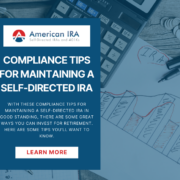Self-Directed IRAs and Commercial Real Estate
 Commercial Real Estate – Keeping it Real!
Commercial Real Estate – Keeping it Real!
Self-Directed IRA investing in commercial real estate is not much different than buying a residential property, except there’s a whole lot more due diligence.
The offering says gross potential, (a.k.a. pro forma). This is one of the things you’ll run into all the time. The seller says it’s got a great pro forma. Here’s what it can generate. You want to find out what it did generate, not what it’s going to generate. You want to keep it real and buy what it’s doing today.
Commercial Real Estate-REOs, Foreclosures, and Distressed Sales
With REOs, foreclosures and distressed sales, you’re going to have to evaluate on a case-by-case and get the real numbers. Obtain properties tax returns. With existing loans, you want to find out can they be assumed? Is there a prepayment penalty? Is there an extension available? What is currently owed and what are the terms?
Commercial Real Estate-Subordinate Financing
The other thing you want to find out is will they allow subordinate financing? Many commercial loans don’t allow subordinate financing. If you’re looking at creative financing or all-inclusive deeds of trust and if you can’t put a second on there, that creates a problem. We have a way around that.
Commercial Real Estate – Documents
- Leases
- To protect your Self-Directed IRA, verify the income of the property. A lease is the most important document. Are there any special arrangements? The landlord says they’re paying $1,000 a month, but it turns out that I’m obligated every year to repaint the place, re-carpet the place, they have first right of refusal on the lease next door at a below market rate. Does it match the rent roll?
- Read every lease line by line and make notes, or get somebody that knows how to read leases line by line. Who owns the lease hold improvements?
- Rent rolls
- Help identify the turnover or collection issues
- Lists the names, the rent, and the contact information
- Tenant file
- You should have an application, a credit report, a criminal background report, a signed current lease, and a variety of other things.
Commercial Real Estate – Expenses
Utility Bills
- Check the utility bills for usage. You may have a tenant in there that’s using too much water, too much electric or too much gas if they’re centrally metered on a large commercial project, but they’re sub-metered.
Insurance
- Is the property properly insured?
- Does the insurance need to be increased?
- Will the current insurance company be writing that type of insurance next year?
- Are there any planned rate increases for this type of policy?
Property Taxes
- When are they reassessed?
- Are they delinquent? If they’re delinquent it means there’s an opportunity there for renegotiation with the seller. Obviously they’re not telling the truth or there are going to be problems other places.
- When is the property reassessed? In California for example, it’s reassessed at sale. Different states do different things.
- How does the property compare to similar properties in the assessed value? Is it higher or lower? The reason why that’s important is because you may have an opportunity to lower the taxes, which creates more income. It goes the other way too.
Commercial Real Estate – Title
You want to make sure that you get a good title company, and that ALTA will cover easements, encroachments and other title issues. To get an ALTA you need to make sure that the survey is correct. These steps are important, you don’t want your Self-Directed IRA to end up with the building on the wrong lot!
Commercial Real Estate – Third Party Reports
- Appraisals
- Zoning
- Make sure it’s zoned properly. If you’re expecting to be able to put 18 units per acre on there and you go down to the county and they say you can only put 16, that will affect the value of the property.
- Permits and Licenses
Commercial Real Estate – Key Points
- Tenant estoppel letter
- Mike signs a tenant estoppel letter that he says I’m paying $1,000 a month, my lease started on September 1, 2009, it’s paid through August 1, 2012 and there are no other agreements written or oral than these terms and conditions.
- Mortgage Estoppel letter
- This is the same thing. The lender says these are the terms and conditions, and that is in fact the case, particularly with a private party.
- All documents related to property should be requested and verified. Get a list of the personal property.
- Create a cash flow statement on your numbers; keep it real…not pro forma.




